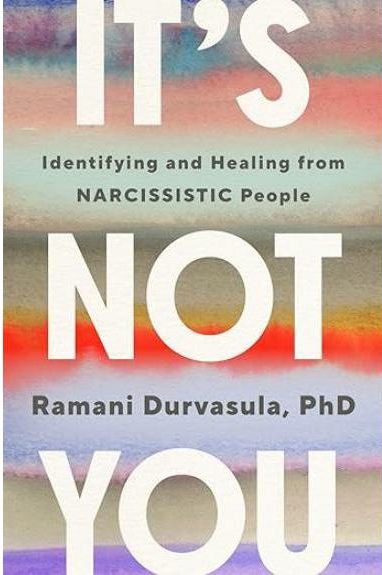- Hardcover Book
- Durvasula PhD, Ramani (Author)
- English (Publication Language)
- 368 Pages – 02/20/2024 (Publication Date) – The Open Field (Publisher)
Dr. Ramani Durvasula’s book, ‘It’s Not You,’ explores healing from narcissism, offering survivors of abuse practical tools to regain self-empowerment. Through insightful perspectives, survivors can navigate the intricate effects of narcissistic abuse, reclaiming their self-worth and setting boundaries for emotional well-being. The book provides a roadmap for those seeking validation and practical strategies to heal from the trauma of narcissistic relationships, making it a valuable resource in the journey towards recovery. Further insights into the healing process and strategies await those interested in grasping and overcoming the impacts of narcissistic abuse.
Book Overview
In her book ‘It’s Not You: Identifying and Healing from Narcissistic People’, Dr. Ramani Durvasula explores the intricacies of healing from narcissistic abuse across various types of relationships. The book investigates the impact of narcissistic individuals in families, romantic relationships, and other life spheres. Dr. Ramani provides guidance on grasping the effects of abuse, empowering survivors to navigate the aftermath, and ultimately thrive. By offering practical strategies, the book equips individuals with tools to manage complex emotions and handle toxic relationships. Dr. Ramani’s compassionate approach aims to assist survivors in overcoming feelings of guilt and rumination, enabling them to reclaim their self-worth and autonomy. Through clear explanations and structured insights, the book serves as a valuable resource for those seeking to heal from narcissistic abuse.
Healing Strategies
Implementing effective healing strategies is pivotal in maneuvering the aftermath of narcissistic abuse and reclaiming self-worth. Dr. Ramani Durvasula’s book ‘It’s Not You’ offers a holistic approach to healing from narcissistic abuse, providing survivors with practical tools and insights to navigate the challenging journey ahead. Here are four key strategies outlined in the book:
- Setting Boundaries: Establishing clear boundaries is essential in protecting oneself from further harm and manipulation.
- Self-Care Practices: Prioritizing self-care activities such as meditation, exercise, and therapy can aid in rebuilding emotional strength and resilience.
- Seeking Support: Connecting with a therapist, support group, or trusted individuals can provide validation, guidance, and a sense of community.
- Journaling: Writing down thoughts and emotions can help process trauma, track progress, and gain clarity on one’s healing journey.
Impact of Narcissistic Abuse
Following the discussion on implementing effective healing strategies in response to narcissistic abuse, recognizing the profound impact of such abuse on individuals’ physical and psychological well-being is essential. Narcissistic abuse can manifest in physical ailments such as chronic fatigue, fibromyalgia, and autoimmune disorders due to the chronic stress and emotional turmoil inflicted by narcissistic individuals. Additionally, victims often struggle with deep-rooted feelings of shame, guilt, and trauma bonds that can greatly impact their mental health. The psychological effects of narcissistic abuse, including gaslighting techniques used to manipulate and control victims, can lead to long-lasting emotional scars. Addressing these impacts is vital in the healing process, as grasping the full extent of the damage caused by narcissistic abuse is the first step towards reclaiming one’s well-being and autonomy.
Testimonials and Recommendations
Upon reviewing reader feedback and endorsements, it is evident that the book ‘It’s Not You: Identifying and Healing from Narcissistic People’ by Dr. Ramani Durvasula is highly regarded as a valuable resource for survivors seeking insight and recovery from narcissistic abuse.
- Readers praise the book for its validation of survivors’ experiences and practical advice.
- Many recommend the book as a valuable resource for comprehension and healing from narcissistic abuse.
- The book is seen as essential support for survivors and is described as a necessary tool for maneuvering healing journeys.
- Endorsements highlight the book’s ability to provide clarity and empowerment to individuals dealing with the aftermath of narcissistic relationships.
Author and Expertise
Dr. Ramani Durvasula, a prominent expert in the field of narcissism, showcases her extensive knowledge and structured approach in the book ‘It’s Not You: Identifying and Healing from Narcissistic People’. Dr. Ramani’s expertise is evident in her ability to unravel complex narcissistic behaviors and provide practical strategies for healing. Her clear explanations and compassionate tone resonate with readers seeking to understand and overcome narcissistic abuse. The structured approach taken by Dr. Ramani in the book offers a roadmap for individuals to navigate the challenging terrain of relationships with narcissistic individuals. Readers appreciate her insights and recommendations, finding value in her in-depth knowledge of narcissism and the psychological impact of abuse.
| Expertise | Structured Approach | In-depth Insight |
|---|---|---|
| Evident | Clear Explanations | Insights |
| Practical Strategies | Compassionate Tone | Psychological Impact |
| Unraveling Behaviors | Roadmap for Healing | Recommendations |
Conclusion
To sum up, ‘It’s Not You: Identifying and Healing from Narcissistic People‘ by Dr. Ramani Durvasula offers invaluable insights and strategies for individuals maneuvering relationships tainted by narcissism. With a compassionate approach and expert guidance, this book serves as a beacon of empowerment for survivors of narcissistic abuse. By shedding light on the psychological impact of abuse and providing practical tools for healing, ‘It’s Not You’ stands as an essential resource for those seeking to reclaim their autonomy and self-worth.


Leave a Reply
You must be logged in to post a comment.